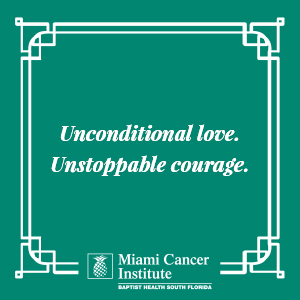April 7, 2020 by John Fernandez
Cancer Survivors Return to Living

On the first Sunday of every June – this year, June 7 – people of all ages, races and socioeconomic backgrounds, who have endured a cancer diagnosis and the treatment that follows, understand the significance of Cancer Survivors Day.
Their lives, once filled with normal routines, quickly shifted to regular doctor and treatment appointments, and they experienced the psychological and emotional stress that accompanies a cancer diagnosis. So when they complete their treatment and look to their future as a cancer survivor, their perception of living has changed, and they must again adapt to a new phase of their lives.
Becoming a Survivor
“Cancer survivorship means the end of treatment, but living takes on different meaning for these patients,” said Gladys Giron, M.D., associate medical director of the Baptist Health Breast Center, who works with breast cancer survivors to transition them from cancer treatment to maintaining a schedule of regular checkups and a healthy lifestyle. “Even though they have had a cancer diagnosis and have completed their treatment, they must remain vigilant about their health.”
Survivorship Rates
The American Cancer Society estimates that nearly 14.5 million Americans, as of January 1, 2014, have undergone this transition. And it reports that the five-year survival rate for any cancer diagnosed between 2004 and 2010 is 68 percent, versus 49 percent between 1975 and 1977.
Dr. Giron attributes these improved survival rates to a greater awareness of early detection, better screening techniques and advanced treatments – all factors that are celebrated by her and survivors at Cancer Survivors Day events throughout the country.
“Once cancer patients get through their treatment, many just want to move on with their lives,” Dr.Giron said. “But we must help them re-enter the world of primary care and regular health maintenance.”
The Survivorship Plan
That is why the Breast Center, soon to be a part of Baptist Health’s Miami Cancer Institute, began working with patients to develop a survivorship plan when they complete treatment. Developed with input from medical and surgical oncologists, certified nurse practitioners, genetic counselors, social workers, research coordinators and dietitians, the survivorship plan helps survivors stay focused on their health for the next two years.
During an appointment to review the survivorship plan and the watchful surveillance of the patient’s health, the medical team recaps the patient’s diagnosis, common and unique characteristics of the patient’s particular type of cancer and the treatment received. The team also goes over a recommended schedule of visits the patient should have with a primary care physician. If the patient doesn’t have a primary care physician, one is recommended. Patients have the opportunity to discuss their concerns and seek support and community resources they may need to help cope with the uncertainty that many cancer survivors face.
“The key to survivorship programs like ours is that we listen to the patients and understand their fears,” Dr. Giron said. “No two survivors are the same, yet many have come to feel a sense of support and security from their caregivers during their treatment. When they get to the end of their treatment and know they will no longer have that constant support and attention, they can feel alone and scared. We work to transition that support to their primary care team.”
Survivorship Support
As more is learned about the need for a planned transition of cancer patients back to their lives after treatment concludes, survivorship programs and support groups are taking root across the country. Baptist Health offers in-person support groups and a blog dedicated to highlighting resources and inspiration for cancer patients and survivors. The American Cancer Society has also established a Cancer Survivors Network.
Dr. Giron applauds these efforts and the establishment of Cancer Survivors Day 28 years ago.
“As more people survi ve cancer, they should have the guidance and support to help them embrace their lives once again.”
ve cancer, they should have the guidance and support to help them embrace their lives once again.”
###
Want to pay tribute to a cancer survivor you know? Visit MiamiCancerInstitute.com/Tribute, using the hashtags #CancerSurvivorTribute and #MiamiCancerInstitute.
See Related Stories:
top stories












There are no comments